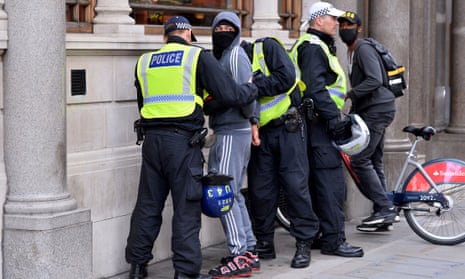I wonder how many times you’ve been “stopped” in your life. I wonder what comes to mind when I ask that. The chances are it depends on your race. Black men will know exactly what I’m talking about, and for all too many, being stopped and searched by police is a routine element of their daily lives. One young boy from south London has been stopped and searched 30 times over two years. That’s more than once a month. He is only 14.
Stop and search has been a controversial feature of policing for decades. You might think it was being reduced, in a post-Macpherson, post-Black Lives Matter world, where people have been talking about how to decrease the grossly disproportionate overpolicing of black communities for so long. But shockingly, provisions in the policing bill will widely increase its use and water down the need for suspicion in a number of ways. If it passes, the bill will enable police to stop and search people subject to certain orders at any time without any suspicion; and anyone at all in a certain area, if they believe certain types of protests might take place nearby.
We know that stop and search is overwhelmingly used on one particular group: black people are at least eight times as likely as their white counterparts to be stopped and searched. The constant threat of stop and search makes young black men and boys nervous around the police; it chips away at trust and respect and means the very people who are meant to be viewed as protectors, are viewed as oppressors.
Community engagement needs to be seen as crime prevention and essential to effective policing. Gangs thrive where policing is not legitimate and if we want to protect communities from the minority of people involved in serious violence, we must ensure we have meaningful and long-term community engagement in the most deprived areas. Real crime prevention requires police to work with communities to build trust so that they feel confident in letting us know who is causing most harm. You simply cannot enforce your way out of serious violence.
I know that all too well from my time spent living and policing in Northern Ireland, which witnessed the most violent and protracted conflict to take place in the UK in living memory. I joined as a constable in 1999 and spent 10 years in the Police Service of Northern Ireland’s armed response unit before being promoted to inspector. In 1999, we had about 13,500 police officers, backed up by more than 7,000 military personnel with static checkpoints going into most towns and cities.
I have no doubt the use of stop and search in Northern Ireland saved lives, but despite the heavy footprint and use of powers, the killing still continued until we sat down with those engaged in the violence and put measures in place to deal with the causes of violence. Now, we police a larger population with about 7,000 police officers, and with no military personnel routinely patrolling with us. Despite the progress that has been made, we still have active paramilitaries coercing and exploiting the community; these paramilitaries thrive in areas where trust in the police is low and where communities feel powerless to speak out against them. Individuals will often work with the police if they are treated with courtesy and respect instead of as suspects with no sufficient grounds.
Both the College of Policing and Her Majesty’s Inspectorate of Constabulary have questioned the effectiveness of existing stop-and-search powers in the detection and prevention of crime. Both bodies concluded that the overuse and misuse of the power has clearly undermined public trust and confidence in the police, specifically among Black and Asian communities who are so disproportionately targeted.
These warnings should be heeded. It’s often said that it’s natural for police to want ever more powers. The old adage is it’s for police to ask and the minister to say no. In this case, though, important voices from within policing, and policing oversight bodies, are united in their opposition to the increased use of stop-and-search powers included within the policing bill. The last thing we need is more of what doesn’t target the causes of crime or reduce serious violence.
Andy George is president of the National Black Police Association
